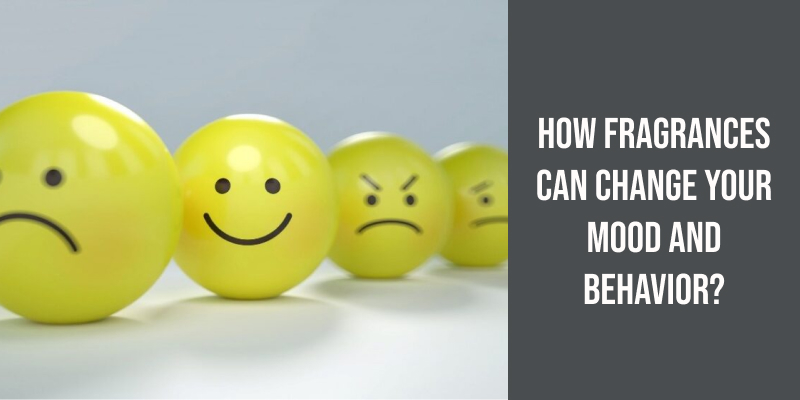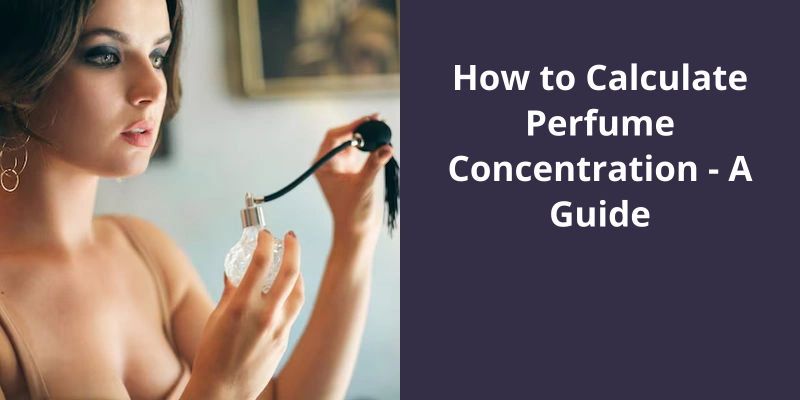Fragrances can significantly change your mood and behavior by triggering certain reactions in your brain. Upon inhaling a scent, your olfactory nerves send signals to your brain’s emotional powerhouse, also known as the limbic system. This is the part of the brain that controls emotions, moods, and memory. Scents like lavender and jasmine can fill you with calm and relaxation, reducing stress and anxiety. On the other hand, citrus fragrances energize and uplift, boosting your mood and alertness. Thus, fragrances have the potential to manipulate and enhance our emotions and overall mood, as well as influencing our behavior.

Here are some ways fragrances can change your mood and behavior:
- Mood Enhancement: Certain fragrances, such as floral scents like lavender, rose, and chamomile, have been shown to promote relaxation and reduce feelings of stress and anxiety. In contrast, citrus scents like lemon and orange are known for their uplifting and energizing effects, helping to improve mood and increase alertness.
- Stress Reduction: Aromatherapy, which uses natural fragrances to promote well-being, is often employed to alleviate stress and induce a sense of calmness. Scents like chamomile, lavender, and sandalwood are commonly used in aromatherapy to promote relaxation and reduce stress levels.
- Improved Focus and Concentration: Some fragrances, particularly peppermint and eucalyptus, are believed to enhance focus, mental clarity, and cognitive performance. Inhaling these scents may help improve concentration during tasks or studying.
- Appetite Modulation: Certain fragrances, such as vanilla and green apple, have been found to decrease food cravings and appetite. This effect can be helpful for individuals trying to manage their weight or maintain healthy eating habits.
- Enhanced Memory Recall: Fragrances have the ability to evoke powerful memories and emotions. The olfactory system is closely linked to the brain’s hippocampus and amygdala, which are involved in memory and emotional processing. Inhaling a particular scent can bring back vivid memories and associated emotions.
- Social and Emotional Connection: Fragrances can influence social interactions and emotional connections. People often associate certain scents with positive experiences, leading them to feel more comfortable and connected in social settings.
- Arousal and Sensuality: Some fragrances, such as ylang-ylang and jasmine, are believed to have aphrodisiac properties and can enhance feelings of sensuality and intimacy.
It’s important to note that individual responses to fragrances can vary, and cultural factors may also influence how people perceive and react to different scents. Additionally, the quality and authenticity of the fragrance play a significant role in its effects.
How Do You Get Perfume to Stay on Your Skin?
Another trick is to layer your fragrances by using a scented body wash or lotion that’s the same notes as your perfume. This helps to create a base layer that will keep the scent locked in and prevent it from evaporating too quickly. Additionally, applying your perfume to your hair or clothing can also help the scent last longer. However, it’s important to be mindful of the type of fabric youre using as certain materials, such as silk or cashmere, can absorb and retain scents better than others.
It’s also important to consider the concentration of your perfume as this can affect how long the scent lasts on your skin. Generally, parfum or perfume extract have a higher concentration and tend to last longer than eau de parfum, eau de toilette, or cologne. However, it’s important to remember that the higher the concentration, the more expensive the fragrance can be.
In addition to these tips, it’s important to store your perfume correctly to ensure it stays fresh and potent for as long as possible. This means keeping it away from direct sunlight or heat, and storing it in a cool, dry place. It’s also important to avoid shaking your perfume bottle as this can introduce excess air into the formula, causing it to oxidize and lose it’s quality.
Ultimately, the key to making perfume last on your skin is to be proactive and intentional with how you apply and maintain it. By taking the time to prep your skin, layer your fragrances, and store your perfume properly, you can ensure that your favorite scent lingers on your skin for as long as possible, making you feel confident and alluring all day long. So next time you reach for your perfume, remember these tips and enjoy the long-lasting benefits.
If you suspect that you’ve developed an allergy to fragrance, it’s important to see a doctor for proper diagnosis and treatment. But what exactly causes fragrance allergies, and how can you manage them? Let’s dive deeper into this topic and explore some tips for living with a fragrance allergy.
Can You Develop an Allergy to Fragrance?
Fragrances and perfumes are often used to enhance personal hygiene and cleanliness or to give a good impression in social settings. However, for some individuals, the use of fragrances or being in close proximity to someone who’s wearing perfume can lead to unwanted physical reactions. These reactions vary from mild irritation to more severe symptoms such as respiratory problems, headaches, or skin rashes. While most people can tolerate fragrances, some individuals can develop an allergy.
An allergy is a reaction triggered by exposure to a particular substance, known as an allergen, that the immune system recognizes as foreign and harmful. In this case, the allergen is one or more of the chemicals in fragrances or perfumes. When exposed, the immune system produces antibodies and chemicals that cause the release of histamine, a substance that leads to inflammation and allergic reactions. The severity of the reaction depends on the individuals sensitivity to the allergen.
The chemical composition of fragrances and perfumes is complex and not well-regulated. In some cases, the same fragrance can have different compositions depending on the manufacturer or the country of origin. The average perfume contains about 14 different chemicals that could trigger an allergic reaction, and some contain more than 100 different chemicals. The most common allergens in fragrances are limonene, linalool, geraniol, citral, and eugenol.
The inhalation of fragrances can cause irritation and inflammation in the airways, leading to bronchial constriction, coughing, and wheezing. Exposure to fragrances can also trigger migraines and headaches in susceptible individuals. Some people may experience skin reactions such as redness, itching, or hives.
This may involve avoiding perfumes, wearing natural or hypoallergenic fragrances, using fragrance-free personal care products, and avoiding public spaces with heavy fragrances such as perfume sections in department stores or beauty salons. If you experience severe symptoms, you should seek medical attention. An allergist can perform skin tests or blood tests to identify the specific chemicals that trigger your allergy and recommend appropriate treatment, such as antihistamines or immunotherapy.
It’s not uncommon for someone to experience a baffling change in the way their perfume smells on their skin. Many factors can affect the way perfume behaves on an individual, contributing to a volatile, unpredictable result. In this article, we’ll dive into some of the most significant factors that can alter the scent of your favorite perfume when it comes in contact with your skin.
Why Does My Perfume Suddenly Smell Different on Me?
The pH balance of your skin is one of the biggest determining factors in whether or not a perfume smells different on you than it does on someone else.
People with drier skin may find that a perfume smells overly strong or cloying, while those with oily skin may find that the perfume fades quickly or smells slightly different due to the excess oil. Additionally, those with skin conditions like eczema or psoriasis may also find that a perfume smells different on them due to the presence of skin irritations.
Hormone levels can also have a significant impact on the way that perfumes smell on your skin. Women, in particular, may find that their menstrual cycle affects the way that certain scents interact with their skin, making them smell different during different times of the month.
What you eat can also have an effect on how a perfume smells on your skin. This is why many experts recommend avoiding heavily spiced or strongly flavored foods when you plan to wear perfume, as they can cause interference with the scent.
This may include choosing scents that are formulated for your skin type, avoiding heavily spiced foods, and being mindful of hormonal fluctuations that may occur throughout the month. With a little bit of care, you can ensure that your perfume smells just as beautiful on you as it does on anyone else.
Source: Why does my perfume suddenly smell bad?..
Perfumes have been a part of our daily lives for as long as we can remember. They come in different scents, and each fragrance is unique in it’s own way. However, not many people know what goes into making these fragrances. One of the gases that are released during the process is carbon dioxide. This gas is used in the extraction of essential oils from plants and is an important part of the perfume-making process. In this article, we will take a closer look at the role of carbon dioxide in the perfume industry and how it’s used to create some of the world’s most popular fragrances.
Which Gas Is Release From Perfume?
Perfumes are widely used by people all over the world as they help in providing a unique scent that can enhance ones personality. However, have you ever wondered what type of gases are released from the perfume? This gas is used in the extraction process of perfume and plays a vital role in ensuring the quality of the end product.
Carbon dioxide is a crucial component in the perfume industry. The extraction process of perfume involves using it as a solvent to extract the essential oils from plants. This process is known as the supercritical fluid extraction method. Carbon dioxide is widely preferred over other solvents as it’s non-toxic and non-flammable, making it a safe option for use in the industry.
The supercritical fluid extraction method is highly effective in extracting the essential oils from plants, yielding high-quality products. This method also ensures that the perfume is free from any residue or impurities, providing a clean and pure scent.
It’s a safe solvent that’s widely preferred over other solvents, providing a clean and pure scent. Carbon dioxide also plays a significant role in the preservation of perfume, leading to a longer shelf life. It’s effectiveness as an antimicrobial agent also makes it ideal for use in packaging.
The Process of Making Perfumes: From Sourcing Ingredients to Packaging
The art of creating perfumes involves several steps, starting from sourcing quality ingredients to blending them in perfect proportions. After blending, the mixture undergoes a maceration process before it’s filtered and further diluted. The final product is then bottled, labeled, and packaged for retail. Each step requires precision and skill to ensure that the finished fragrance meets the desired quality standards.
Understanding the unique properties of perfume can enhance our appreciation of the beauty industry. As a mixture of essential oils, synthetic aromas, and fixatives, perfume goes through a fascinating phase change once it’s out of the bottle. Let’s explore this aspect of fragrance in more detail.
What Phase of Matter Is Perfume?
The liquid phase of perfume is the initial stage of the fragrance that’s created through the blending of different aromatic compounds, solvents, and fixatives. The solvents used are typically alcohol or a mix of water and ethanol. These help to dissolve the aromatic compounds and fixative agents and allow for a homogeneous mixture. The fixatives used are substances that help to stabilize the fragrance, slowing down the evaporation of the perfume and increasing it’s longevity.
The conversion of perfume from a liquid state to a gas occurs when the fragrance is exposed to the air. This happens because the molecules in the perfume have kinetic energy due to their temperature, which makes them move faster and eventually evaporate from the surface of the liquid. At a low concentration in the air, we can perceive the smell of the perfume. In this gaseous stage, the perfume molecules can interact with receptors in our nose and trigger the perception of the scent.
Perfumes are typically stored in opaque containers because, as they’re exposed to light, they may undergo chemical reactions that can alter their scent. Similarly, changes in temperature or improper storage can also cause the fragrance to deteriorate. This is why it’s important to store perfumes in cool, dry, and dark places to prevent degradation.
The gaseous phase of perfume can also be manipulated to achieve the desired concentration and intensity of the fragrance. For example, different types of atomizers can be used to create a fine mist with a higher concentration of perfume particles that can linger in the air for longer periods. The concentration of perfume in the air depends on factors such as the viscosity of the liquid, the surface area of the perfume exposed to the air, and the airflow in the environment.
Conclusion
Overall, fragrances have the ability to influence mood, behavior, and emotions, making them a valuable tool in various therapeutic and personal settings. Whether through aromatherapy, personal fragrance choices, or the use of scented products, harnessing the power of fragrances can positively impact overall well-being and enhance daily experiences.




